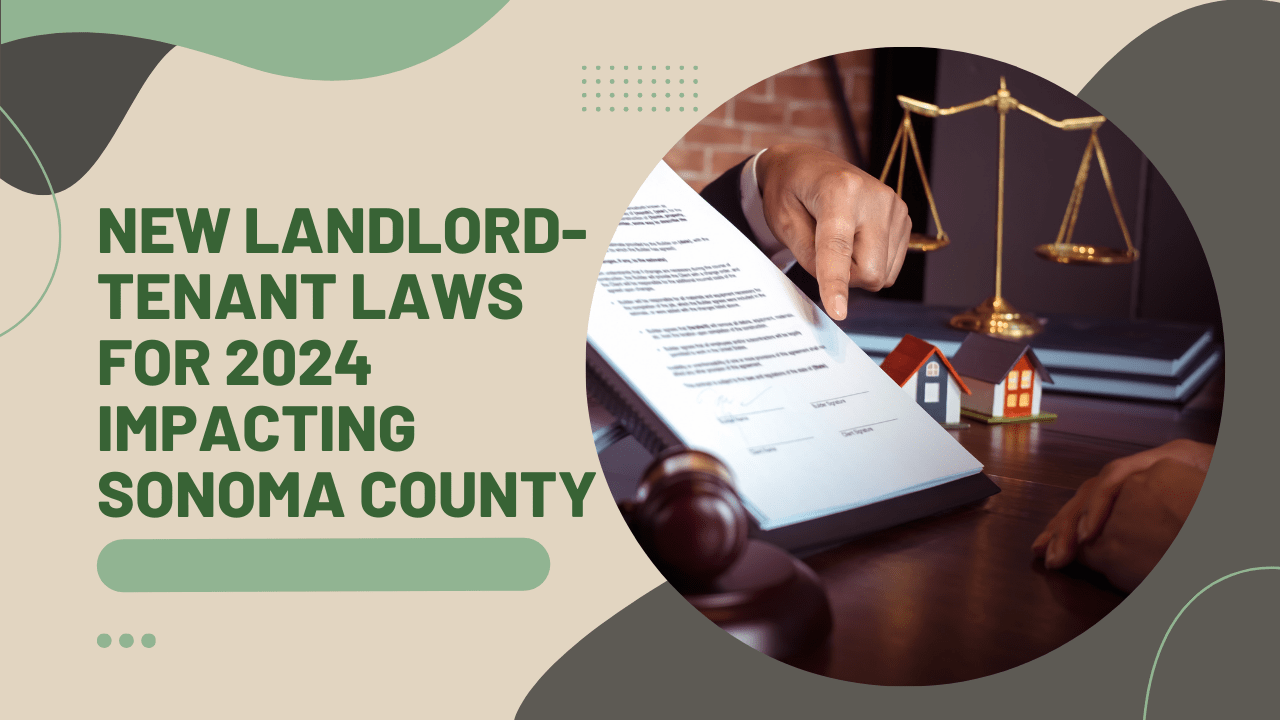
An experienced Sonoma County property management company, D & G Equity Management
serves area landlords and real estate investors with single family homes, multi-unit properties
and commercial units throughout the Russian River Valley. We understand the challenges DIY
landlords and rental property owners face in keeping up with California’s ever evolving landlord-
tenant laws, and 2024 brings significant changes that will impact the industry. This blog aims to
educate and guide landlords by highlighting key legislative changes. We are not attorneys,
however, and this is not meant to convey legal advice. We strongly encourage you to
consult your real estate attorney for your specific needs.
SB 329 (2019) Update Protections Specifically for Section 8 Voucher Holders
“Existing state law (Government Code sections 12927 and 12955) prohibits discrimination
against renters who hold Section 8 vouchers. Landlords cannot discriminate based on “source
of income”. This means that you have to treat all Section 8 applicants with the same criteria that
you apply to other prospective renters.”
SB 267: No Credit History Allowed Update to Government Code Section 12955 (o)
This law prohibits rental property owners from using a person’s credit history as part of the
application process – if they have a government rental subsidy, such as Section 8 — without
offering the applicant the option to provide alternative evidence of a verifiable legal means to
pay their portion of the rent.
AB12: Security Deposits for Residential Rentals
Effective July 1, 2024, AB12 brings a significant change in the rules regarding security deposits
for residential rentals in California. Its enactment is seen as a step towards reducing the
disproportionate financial burdens on renters and ensuring a fairer housing market. However, it
also raises concerns for landlords, particularly in terms of financial security and the ability to
cover costs in case of significant property damages.
Here’s a brief overview of the key aspects of AB12 and its implications for landlords and
Tenants:
- Limitation on Security Deposits: AB12 restricts landlords from demanding a security deposit greater than one month’s rent for prospective tenants. This new legislation aims to make housing more accessible and affordable by lowering the financial barrier of hefty security deposits, which were previously allowed to be as high as two or three months’ rent for unfurnished and furnished units, respectively.
- Landlord Rights: Despite the limitation on security deposits, landlords retain the right to seek damages from tenants for harm to the property that exceeds the security deposit amount. This provision safeguards landlords against potential losses from property damage.
- Exceptions for Small Landlords: There is a specific exemption for small landlords who own no more than two residential rental properties with a total of no more than four dwelling units. In such cases, these landlords can demand up to two months’ rent as a security deposit. However, this exemption does not apply if the prospective tenant is a service member, where the cap remains at one month’s rent.
AB12 also introduces stricter safety regulations in rental units, requiring landlords to ensure that
their properties meet specific safety standards. This includes regular maintenance checks and
immediate repairs to essential utilities.
SB71: Landlord Obligations Re: Transparency
SB71 requires landlords to provide more detailed documentation at the start and end of
tenancies, including itemized lists of existing property damages. This bill aims to enhance
transparency and avoid disputes over security deposits.
SB 567 (Amendments to AB 1482): Aiming to Stabilize Sonoma County Rental Market
Effective April 1st, 2024, SB567 amends the Tenant Protection Act of 2019 (AB1482) by refining
rent cap calculations for permissible annual rent increases. Rent increases are generally
capped at either 10% or 5% plus the change in the Consumer Price Index (CPI), whichever is
less.
The amendment also narrows the circumstances under which landlords can evict tenants
without cause, further protecting long-term tenants. Key points updated include:
- Eviction Reasons: SB567 tightens the reasons landlords can evict tenants, providing more protection for long-term tenants. Even if a property converts to a month-to-month lease after the completion of the initial term, a landlord cannot evict a tenant unless you have one of several identifiable reasons for eviction. These reasons are now split into two categories: At Fault/Just Cause and No Fault/Just Cause.
- Owner Move-ins: Under SB567, if a landlord evicts a tenant to either move back into the home or have a family member move, the new resident must start living there within 90 days of the eviction and must live there for at least 12 months. This aims to prevent misuse of this eviction reason. Additional language is required in the notice to terminate tenancy.
- Substantial Remodels/Renovations: If considering significant structural, plumbing, or electrical work in the property, landlords must now provide detailed plans and evidence for any significant renovations and inform tenants of their right to return as residents at the same rent. if the renovations aren’t started or completed for any reason. Additional language is required in the notice to terminate tenancy.
SB 712: Your Tenants’ Micro Mobility Devices
Under this law, tenants can store micro mobility devices like e-bikes and e-scooters in their
rental units if the devices’ batteries are approved by the Consumer Product Safety Commission
or comply with European Product Standards. If the batteries don’t meet these standards,
landlords can ask tenants to insure the device and forbid charging it inside the unit. Moreover, if
landlords offer secure, long-term external storage, they can require these devices to be stored
outside the unit.
Key Takeaways for Successful Sonoma County Property Management
- Stay Informed: Regularly update your knowledge of these laws.
- Documentation is Key: Maintain thorough records of all interactions and transactions with tenants
- Prioritize Safety and Fairness: Ensure your properties are safe and that you treat all tenants fairly.
- Seek Professional Advice: Consider consulting a legal professional to navigate complex legal changes.
 With rent control laws on the books until at least 2030 and the additional new requirements,
With rent control laws on the books until at least 2030 and the additional new requirements,
2024 promises some significant legislative shifts for rental housing providers. Being aware of these landlord-tenant law changes well in advance is key for crafting proactive business strategies. As your property management partners in the Russian River Valley, and around the Sonoma County area, we’re here to help interpret what new legislation could mean for your specific rental property situation. Contact us at D & G Equity Management; we’ll be happy to help you with all your rental property management needs.
